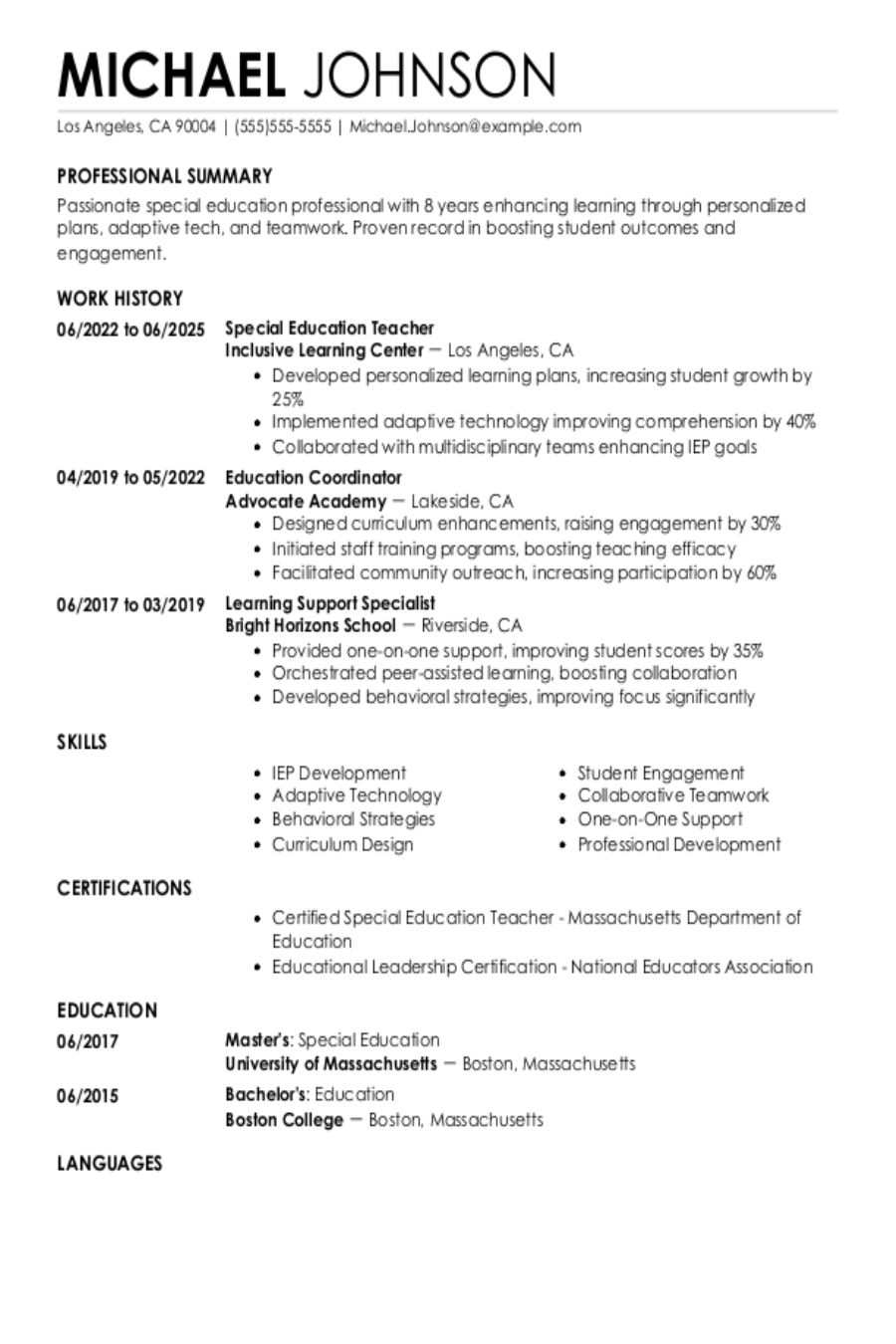Popular Builder Resume Examples
Entry-level builder resume
An entry-level resume for a builder should focus on relevant skills, hands-on training, certifications, and any volunteer projects to demonstrate practical knowledge and commitment to the trade.
Places skills over experience: Using a functional resume format allows this candidate to highlight their project management and construction skills, such as leading teams and optimizing budgets, showcasing qualifications over limited work history.
Prioritizes readability: Using a simple resume template can highlight key achievements, such as cost reduction and efficiency improvements, which makes it easy for recruiters to quickly identify qualifications.
Mid-career builder resume
A mid-career builder's resume should emphasize a solid mix of hands-on experience, technical skills, and continuous professional development to effectively demonstrate their value in the construction industry.
Balances skills and experience: This builder's resume effectively integrates technical skills in project management and safety compliance with a clear trajectory of career advancement, demonstrating significant accomplishments and professional growth in the construction industry.
Encourages quick scanning: Clean design and effective organization allow hiring managers to quickly identify the builder's significant achievements, improving their understanding of qualifications at a glance.
Experienced builder resume
An experienced builder resume should highlight key projects and skills, clearly demonstrating the job seeker’s growth and achievements in the construction industry.
Follows traditional format: The chronological resume format effectively showcases the job seeker's extensive experience, allowing them to present a clear progression of roles and responsibilities that highlights growth and achievements within the construction industry.
Highlights experience: The resume opens with a compelling summary that showcases over a decade of experience in construction management and site supervision. This effectively establishes the applicant's expertise and sets a professional tone.
No experience builder resume
A resume for an applicant with no experience should highlight relevant skills, certifications, and any hands-on projects or training that showcase the applicant's practical knowledge and eagerness to learn in the construction field.
Avoids jargon: Job seekers often inflate basic tasks with jargon or complex descriptions, making simple achievements sound more technical than necessary. A straightforward approach like yours highlights genuine skills and contributions effectively, improving clarity and professionalism.
Draws from diverse experiences: Including volunteer work and extracurricular activities on a resume demonstrates teamwork, leadership, and commitment to community. This is helpful for an inexperienced candidate.
More resume examples
Additional Guides
Builder Resume Template
Looking to create your next project? Start with this versatile builder template, which you can easily adapt by replacing the details with your own unique information.
Jane Wilson
Lakeside, CA 92042
(555)555-5555
Jane.Wilson@example.com
Skills
- Project Management
- Blueprint Reading
- Structural Design
- Safety Compliance
- Material Estimation
- Team Supervision
- Quality Assurance
- Problem Solving
Certifications
- Certified Construction Manager (CCM) - Construction Management Association of America
- OSHA 30-Hour Construction Safety Certification - Occupational Safety and Health Administration
Education
Master's Civil Engineering
University of Illinois Urbana-Champaign Urbana, Illinois
May 2015
Bachelor's Construction Management
University of Wisconsin-Madison Madison, Wisconsin
May 2013
Languages
- Spanish - Beginner (A1)
- French - Beginner (A1)
- German - Intermediate (B1)
Professional Summary
Dynamic builder with 8 years of experience managing high-value projects. Expertise in structural design, team management, and safety compliance. Proven track record of improving efficiency and reducing costs.
Work History
Builder
Prime Construction Co. - Lakeside, CA
January 2022 - September 2025
- Managed 15+ construction projects annually
- Enhanced project efficiency by 20% through planning
- Supervised 50+ team members across various sites
Construction Supervisor
Solid Foundation Works - Lakeside, CA
January 2017 - December 2021
- Oversaw budgets totaling $25M for major builds
- Developed training improving staff skills by 15%
- Ensured safety compliance for 10+ active projects
Site Manager
Cornerstone Builders Ltd. - Riverside, CA
January 2015 - December 2016
- Reduced material waste by 10% through tracking
- Completed 12 residential projects within deadlines
- Collaborated with architects to improve layouts
Must-Have Skills on a Builder Resume
A strong skills section is vital for any effective resume. It not only showcases what you bring to the table but also aligns your capabilities with potential employers" needs.
The following data highlights key hard and soft skills valued in various roles, based on extensive analysis from our internal database.
When you’re set to improve your resume, remember to use the AI Resume Skills Generator. It provides tailored skill suggestions based on your job title, ensuring a comprehensive and customized skill profile.
Writing Your Builder Resume
Having explored these effective resume examples, you're now prepared to dive into the detailed process of how to write a resume. We will guide you through each section step by step, ensuring you have all the tools needed for success.
List your most relevant skills
Your resume skills section should highlight your expertise in construction techniques, project management, and teamwork skills. Tailor this section by integrating keywords from the job listing to reflect what employers value most. This not only appeals to human recruiters but also ensures applicant tracking systems recognize you as a suitable job seeker.
By using relevant keywords from the job description, you increase your chances of passing initial screenings. Make sure to emphasize skills such as blueprint reading, safety compliance, and leadership qualities. These demonstrate your readiness for the role and align with industry expectations, helping you stand out in a competitive field.
Example of skills on a builder resume
- Proficient in using construction management software for project tracking and coordination
- Adept at interpreting blueprints and technical drawings
- Strong communicator with a knack for fostering collaborative team environments
- Highly organized with effective time management skills
Highlighting your soft skills on your resume can set you apart from the competition. Employers greatly value interpersonal abilities because they are challenging to develop, making them a significant asset in any workplace.
Highlight your work history
The work experience section is your chance to demonstrate how you’ve successfully applied your skills on various projects. By emphasizing specific accomplishments, you can illustrate the impact of your work, helping potential employers see the value you bring.
For each job entry, make sure you include essential information such as your job title, the name of the employer, and the dates of employment. This data not only establishes your professional credibility but also provides context for your experiences. Be clear and concise as you outline what you've achieved in each role.
Example of a builder work experience entry
- Builder
ABC Construction - Dallas, TX
June 2019 - Present - Construct residential and commercial buildings by interpreting blueprints and specifications accurately to meet project requirements
- Supervise a team of 10 construction workers, fostering a collaborative environment that improved project completion time by 15%
- Ensure compliance with safety regulations and building codes, resulting in zero on-site accidents during tenure
- Manage project budgets effectively, reducing material costs by 10% through strategic sourcing and negotiation with suppliers
- Train new employees on best practices in construction techniques and safety protocols, improving overall team performance
Highlighting outcomes and achievements in your experience section is essential because it showcases how you've made a difference in your previous roles. Employers are looking for applicants who can demonstrate their impact, rather than just listing daily tasks. By focusing on results, you present yourself as a proactive builder who delivers value and drives success in projects.
Include your education
The education section of your builder resume should present your qualifications in reverse-chronological order starting with the most recent degree or certification. Include relevant diplomas and specialized training while omitting high school diplomas if you hold a higher degree to keep your resume concise and focused on relevant qualifications.
If you are currently enrolled in a program or have not completed a degree, list your highest level of education achieved along with an expected graduation date. You can also include bullet points that highlight key courses or projects showcasing your skills as they relate to the building industry.
Common certifications for a builder resume
- Certified Construction Manager (CCM) – Construction Management Association of America (CMAA)
- Project Management Professional (PMP) – Project Management Institute (PMI)
- Associate Constructor (AC) – American Institute of Constructors (AIC)
- Green Building Certification – Green Building Certification Institute (GBCI)
Sum up your resume with an introduction
Creating a compelling profile section on your resume is important, as it serves as your first chance to make a strong impression.
If you possess substantial experience in the field, using a professional summary can be very effective. This approach allows you to showcase your key accomplishments and relevant skills right at the top of your resume. If you lack extensive experience, including a career-oriented resume objective can help frame your resume for potential employers.
Professional summary example
Dynamic builder with over 10 years of experience in residential and commercial construction projects. Recognized for successfully managing multiple high-value projects, ensuring timely completion while maintaining strict safety standards. Expert in project management, cost estimation, and team leadership, dedicated to delivering quality craftsmanship that exceeds client expectations.
Resume objective example
Enthusiastic builder eager to use hands-on skills in construction and teamwork to support a growing project team. Aiming to apply strong problem-solving abilities and attention to detail to ensure high-quality craftsmanship and timely project completion.
As a builder, it's essential to keep your resume profile concise yet packed with relevant details. Aim for no more than three sentences that highlight your key skills and experiences. Reserve any additional information for your cover letter, where you can elaborate further on your qualifications.
Add unique sections to set you apart
Including optional resume sections as a builder can help you highlight your unique qualifications and set yourself apart from other job seekers. These sections offer valuable insight into your experiences that may not be evident through standard work history alone.
Incorporating aspects like relevant hobbies or volunteer work allows you to showcase skills and values important to the building industry. For instance, if you’ve volunteered for community construction projects, it shows your commitment to teamwork and service. These elements provide employers a well-rounded view of who you are as a professional and how your personal interests align with their company culture.
Three sections perfect for a builder resume
- Technical Skills: Technical skills are important on your resume as they showcase your specific abilities and knowledge relevant to the builder profession. Highlighting these skills can set you apart from other job seekers and demonstrate your readiness for the job.
- Tools and Platforms: In today's construction industry, computer skills are essential. Skill in project management software, design tools, and estimating platforms can greatly improve efficiency and collaboration on projects.
- Professional Certifications: Certifications showcase your dedication to professional growth. Pursuing industry-recognized credentials not only improves your skills but also boosts your employability in the competitive technical job market.
5 Resume Formatting Tips
- Choose a format that matches your career stage.
Selecting the right resume format depends on your experience. If you have a solid work history, opt for a chronological format to showcase your progression. For those just starting out, a functional resume highlights your skills over experience. Consider using a combination format if you want to balance both aspects effectively.
- Pick a smart resume template.
Using a professional resume template improves readability and makes formatting effortless. A well-structured template allows your skills and experiences to stand out. If you opt for a custom format, ensure it remains clean and uses fonts that are friendly with applicant tracking systems to improve your chances of getting noticed.
- Select an appropriate font.
Opt for clear, professional fonts to improve your resume's readability. Stick with well-known options such as Helvetica, Georgia, or Verdana so both ATS and hiring managers can easily navigate your information.
- Use consistent formatting.
Ensure your resume margins are uniform and text is left-aligned. This creates a polished, professional look that makes your information easy to read.
- Keep your resume to one or two pages.
When crafting your resume, keep in mind that resumes should be one page long in most cases. This approach helps you present your experience clearly and concisely. Focus on what truly matters to make a lasting impression.
Tools for Your Job Search
Are you preparing to apply for that builder position you've been eyeing? Before you hit submit, consider using our ATS Resume Checker. This essential tool offers insights into how your resume performs against the automated systems many companies use to screen applicants during the hiring process.
Want to take your application a step further? Our AI Resume Builder provides tailored recommendations based on your construction background, along with professionally designed templates that effectively showcase your skills and experiences to potential employers.
Frequently Asked Questions
Last Updated: October 1, 2025
Yes, a cover letter is important because it adds depth to your resume, allowing you to communicate directly with employers about why you're the ideal job seeker. It's a chance to express what draws you to the builder role and highlight how your unique skills make you a perfect fit. Take the initiative and write a cover letter that is compelling.
For a quick solution, use our AI Cover Letter Generator. It simplifies creating personalized, job-specific cover letters in minutes. Choose from various cover letter template options that complement your resume, ensuring a polished and professional application package that stands out.
A resume is typically a concise document, ranging from one to two pages, while a CV (curriculum vitae) can be several pages long and includes comprehensive details about your academic achievements, research contributions, and professional experiences. This expanded format allows for a deeper exploration of qualifications in the context of academia or specialized fields.
You should use a CV when applying for positions in academia, science, law, or medicine. If you're unsure whether you need a CV or how to create one, our online CV Maker is an excellent resource. It offers various CV templates tailored to different industries and career levels, allowing you to craft a personalized document quickly and efficiently.
A builder's resume is generally one page long, as this usually suffices to highlight relevant skills and experience. However, applicants with extensive backgrounds may choose a two-page resume format to more effectively showcase their qualifications and projects.
To craft an effective skills section as a builder, integrate your technical abilities, such as skill in construction software and project management tools, with essential soft skills like teamwork and communication. Illustrate how you've applied these skills in past projects to achieve timely and high-quality results, showcasing your overall impact.
To ace your interview, practice job interview questions and answers. This preparation boosts your confidence and equips you to handle any surprises that may come your way.
When applying for builder positions, briefly state your aspirations in your resume summary. For example, mention "Builder aiming to specialize in sustainable construction." Use your cover letter to delve into your goals and express how specific roles align with your career path. Target opportunities that foster growth and skill development to improve your journey.
Was this information helpful? Let us know!
Leisha is a career industry editor dedicated to helping job seekers excel in their careers.
More resources

How to List Excel Skills on Your Resume (40+ Examples, Definition & Tips to Improve)
Learn how to list Excel skills on your resume with our guide f...

What If No One Responds When You Try To Follow Up After a Job Interview?
If no one responds after you try to follow up after a job inte...

How to List Adaptability Skills on Your Resume (35+ Examples, Definition & Tips to Improve)
Our adaptability skills definition and guide will help you wri...

Your Guide to Getting a Job in the Safety and Security Industry
Was this information helpful? Let us know ...



